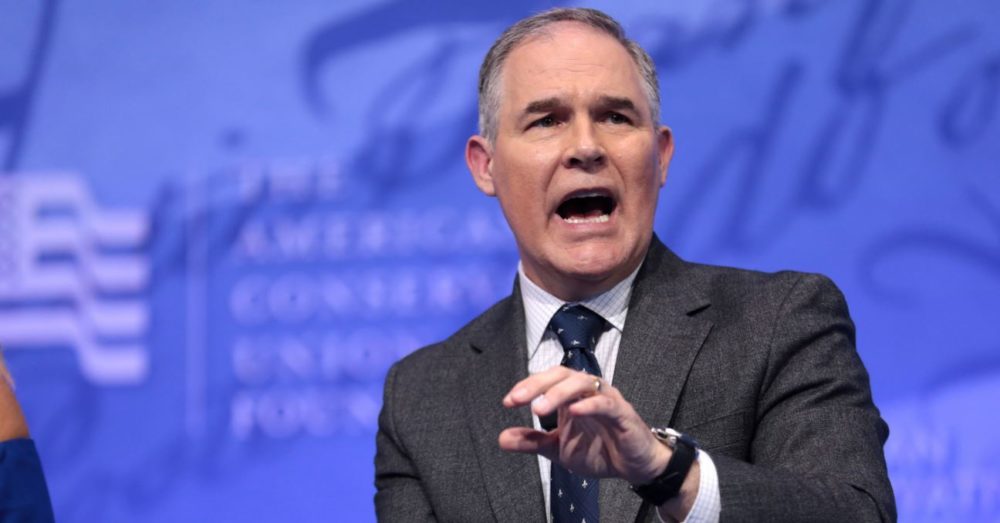UPDATE (June 26, 11:30 am): The next EPA Senate budget hearing is scheduled to start this Tuesday, June 27, at 9:30 am. UCS will begin tweeting about the hearing once it starts. For more on how you can stand up for science in response to President Trump’s proposed budget cuts, check out our local action toolkit.
On Thursday, EPA Administrator Scott Pruitt will appear before the US House of Representatives Appropriations Subcommittee on Interior, Environment, and Related Agencies to discuss the Trump administration’s budget proposal for his agency.
This is the first time Mr. Pruitt will appear on Capitol Hill since his confirmation hearing, and the first time members of Congress will be able to publicly question him about the proposal to slash the EPA budget by 30%. THIRTY PERCENT! The proposal also calls for EPA staffing cuts of the same magnitude.
Make no mistake. These proposed cuts are devastating. They would erode our environmental health infrastructure, gravely diminish our nation’s scientific expertise, threaten our ability to prepare for and deal with emerging threats, lock us into the status quo, and make it virtually impossible for the EPA to do its job.
What’s the job?
Pure and simple—it’s safeguarding public health. Because polluted air, water, food, land, homes, neighborhoods, and workplaces make people sick.
The EPA performs core public health functions that help safeguard our health and safety, like assessing and analyzing health needs and risks; assuring action to manage and communicate those risks; and developing, advocating, and implementing policies and programs that address them.
Indeed, this mission is still reflected on the EPA website, which says that “EPA’s purpose is to ensure that:
- all Americans are protected from significant risks to human health and the environment where they live, learn and work;
- national efforts to reduce environmental risk are based on the best available scientific information….”
EPA science
Science is the bedrock, the backbone, that makes these safeguards possible. The website still describes the agency as “…one of the world’s leading environmental and human health research organizations. Science provides the foundation for Agency policies, actions, and decisions made on behalf of the American people. Our research incorporates science and engineering that meets the highest standards for integrity, peer review, transparency, and ethics.”
That’s why a focus on the proposed cuts to EPA’s science and technology budget is key. The proposed cuts are crippling. (Short-sighted and stupid are also apt descriptors.)
The administration (and Mr. Pruitt) proposes to reduce the EPA’s science and technology budget from $733 million to $450 million, along with deep personnel cuts in the agency’s science programs. That includes the science supporting clean air programs (reduced by $30 million), Homeland Security support (reduced by $14 million), and research on chemical safety (reduced by $42 million) and healthy communities (reduced by $85 million), to pick a few. The proposal also cuts the budget of the EPA’s Office of Research and Technology (ORD) in half; ORD conducts the bulk of the research that underpins all EPA policies.
Slashing the science at EPA is like robbing a clinician of a critical diagnostic tool. The American public expects the EPA to assess, understand, communicate, and manage existing problems and risks, but also to be there and ready when things go bang in the night and new threats emerge. The agency can’t do that without robust science and research, and without scientists who work on the front lines and are valued for the work they do.
Five questions for Thursday’s budget hearing
So far, I have heard Mr. Pruitt talk a lot about the “impact on regulated industry.” He has said that that the purpose of regulations are “to make things regular” for the regulated community. I’m waiting to hear him talk about the agency’s public health and science-based mission. Thursday’s budget hearing is an opportunity to explore these issues.
So here are the top five questions I think we deserve answers to and that I hope the budget subcommittee will ask:
- Do you see the EPA as a public health agency and that agency science is a critical component of good decisions? If so, how and why can you justify reducing spending on science and technology by 30% across the board?
- The National Laboratories across the country under the EPA Office of Research and Development are critical world-class resources not only for the agency, but also for states, tribes, municipalities, and other federal agencies including the Department of Homeland Security. They have been deeply involved in solving problems ranging from the anthrax attack on Congress, to the air quality issues following the 9/11 attacks, to responding to water crises in Flint and elsewhere. Have you ever visited the EPA laboratories and talked to their scientists? How and why do you think that these key public health science resources can continue to function with the large cuts you are proposing? Or do you think these labs are no longer needed?
- All of the EPA’s statutory mandates require that the agency rely on solid science to protect public health and the environment. How do you propose meeting those mandates if you drastically reduce the science capability of the agency? With more than a third fewer scientists, and a third less funding, as well as less funding for grants to the states, tribes, universities, municipalities, and regional collaborations, how can you assure the public that EPA actions and decisions will be based on science and not on politics?
- On the one hand you have repeatedly said that states should take a greater role in environmental protection. On the other hand you have slashed support for the states for everything from grants to regional partnerships. At the same time, you are dramatically reducing the resources in dollars and people in the science programs at EPA. Those science programs directly support collaborative state and federal action. How do you expect the states to take on this supposed greater role without the science resources to do so?
- Your budget proposal with its huge reductions in support for science means that the EPA’s ability to respond to new and emerging issues and threats, from toxic contaminants to homeland security issues, will essentially be lost. As one senior scientist put it, this budget at best “locks us into where we are now in environmental and public health protections as if no new challenges will confront us.” Are you suggesting there are no new challenges to public health and the environment that the EPA should anticipate and be prepared address? Are you suggesting that the current state of knowledge about existing problems—like water and air pollution—is sufficient? Can you tell us how reducing science capacity at the EPA will help us answer these questions and address these needs?
Perhaps the overarching and most important questions of all are whether, with this budget proposal, Mr. Pruitt can assure the American people that we will have the science to keep our drinking water safe, our air clean, our food free from harmful contaminants, and our neighborhoods free from toxic chemicals. Whether he can assure us that the EPA will be ready and able to respond to acute emergencies and threats that may be on the horizon. Whether the budget will support and advance the science and technology needed to bring us into a complex and challenging future.
I have my doubts, though I expect he will try to offer this assurance. It will be up to all of us—we, the people—to hold him accountable. Let’s get him on record on Thursday. Get your own questions out on social media. Here is the info about the hearing.
And be hopeful—we are a long way away from this draconian EPA budget becoming reality. There will be many way, means, and opportunities to engage and push back in the weeks and months ahead. We’ll keep you informed.

